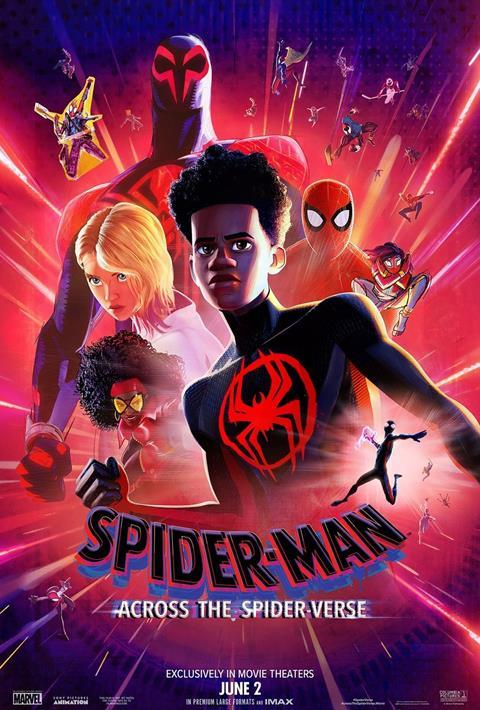Charles Merritt gives a thumbs up to a movie that has properly grown-up themes

The Film: Spider-Man: Across the Spider-Verse
Rating: PG
Watch if you liked: Spider-Man: Into the Spider-Verse
Running time: 136 minutes
Genre: Superhero, Sci-fi, Adventure, Comedy
Overview: When Miles Morales is reunited with Gwen Stacy it’s not everything he’d hoped to be. Instead he learns a shocking truth and is catapulted through the multi-verse trying to prevent his already uncertain future from becoming a nightmare.
Pre-Review: The first Spider-verse movie was an unexpected hit and I would argue it is one of the best superhero movies of all time. I’d even go as far to say it is one of the best animated movies of all time (it won an Oscar for Best Animated Movie). I’d actually go even further and say it is one of the best movies of all time.
Whereas I had gone into the first film with low expectations, with the sequel, try as I may to lower them, I had pretty big expectations. The truth is that it was never going to be able to live up to the first one. Mainly because this is very much a ‘part-one’, setting up for a big finale in next year’s ‘Beyond the Spider-Verse’.
What you liked: Miles Morales is a phenomenal character and Shameik Moore does such a wonderful job at voicing him. You can tell that this character will continue to be a big role model for children of all backgrounds in the years to come.
Visually, this film is once again gorgeous. Every frame deserves to be hung up in an art gallery. The action is flawless and there are at times so much to look at that you can’t fully process what you’re looking at - making the rewatch-ability factor a must.
Although there are less jokes in this film, the comedy is as great as ever. You’ll be chuckling at the moments where you’re supposed to and you can’t ask for more than that.
Like the first movie, there is plenty of heart to be had in this sequel. Particularly with the parental dilemmas that involve Miles’ parents but also Gwen Stacy’s father.
What you didn’t like: The pacing was slightly off for me. It was a lot longer than I was expecting and I could see younger children becoming restless as the action sequences are few and far between in comparison to the first film.
I think there’s the issue of the film being a ‘part-one’ to take into consideration. There’s a lot of setup with very little pay-off - which is understandable as it needs to establish where the story is heading. I’m hopeful that the next film will conclude the trilogy in a way that can bring around more a0ppreciation for this sequel but watching it as an individual film, it felt dissatisfying. This might just have been the screen I was watching it in but the sound mix seemed to be off. I was really struggling to hear the dialogue for the first twenty minutes or so. Again, that could have just been my cinema - I’ll have to see it again to make sure…
Thoughts for parents: This is a grown-up movie. I’ve talked before about how animation is just a genre of movie making and not necessarily one only for children. This is one of those movies where I feel parents might take their young children only to find them be bored and uninterested, despite the hyperactive visuals in certain sequences.
What the film explores is sophisticated and complex - I imagine a lot of it will go over children’s heads
It’s also dark. Where the storyline finishes in this movie is unsettling and I could see younger children finding this to be too much for them. That being said, there is a lot to unpack in this film so here are a few ways to engage in conversation after seeing it.
One of the big questions is around fate. Are things always set in stone? There’s plenty to be explored biblically here. If God knows everything, why did He allow the Fall to happen? If God has everything planned out, why are there occasions in the Bible where God seems to change His mind? How much of a say do we have in our own lives if we have given ourselves away to God?
Alternatively, whether things are set in stone can also be a great question to explore through the lens of mental health. If there are a certain pattern of events, is the outcome always the same? Anxiety is often built around the lie: ‘if something happened once, it will happen again’ - is this true though?
How can we prevent things from happening again? There’s also the question of how we let young people make mistakes to take into consideration. We can’t bubble wrap our kids and protect them from ever making bad decisions. Learning from our mistakes is often the greatest teacher - how can we provide opportunities for teenagers to make mistakes in a safe way?
Finally, Miles is crushed to learn that he isn’t considered good enough to be part of the elite Spider Society. I wonder how many young people feel as though they aren’t good enough for their Christian youth group? I know that I’ve personally found it hard to worship in churches after I was told by a church leader that I wasn’t ‘spiritually mature’. It threw my faith into a state of existential crisis. I became very self-conscious of how I was worshipping or preaching or praying and felt as though I wasn’t a good enough Christian. Of course, the truth is that none of us are ‘good enough’ and that it is only through the grace of Jesus that we are made ‘good enough’ in God’s eyes. But how can we make young people feel welcomed and, more importantly, valued in churches no matter what stage of faith they are at? How do we prevent people from feeling excluded from the church which is meant to be for all? (see another Spiderman movie review here)
































